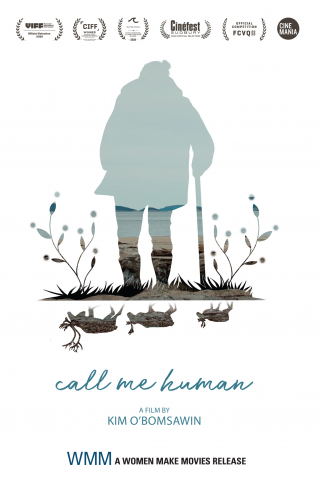
Call Me Human 2020
Distributed by Women Make Movies, 115 W. 29th Street, Suite 1200,New York, NY, 10001; 212-925-0606
Produced by Andree-Anne Frenette
Directed by Kim O'Bomsawin
Streaming, 77 mins
Middle School - General Adult
Biography; Native Peoples; Poetry
Date Entered: 03/15/2023
Reviewed by Joseph Baumstarck, Jr., Adjunct Professor - Ivy Tech Community College and Independent ScholarThis biographical documentary depicts Josephine Bacon, an internationally recognized Innu poet's return to her native tundra community. Along the way, she reminisces about her life, the strange twists it has taken, and how this journey shapes her poetry. Josephine was removed from her native community to attend a government-run boarding school at the age of five. She stayed at the boarding school for fourteen years. Upon discharge from the boarding school, she traveled to Montreal, where she became a poet.
A fascinating but short-shifted aspect of this film is Josephine's attempt to preserve her cultural heritage by preserving the words being lost from her native Innu language. Pointing out that languages are tools to enable people to live their lives, she notes that as life changes and cultures become extinct, words begin to disappear from the vocabulary. As a poet, she tries to use these disappearing words in her poetry, thus requiring their definitions to remain viable and the cultural way of life they were developed to express relevant, even if only in written form. Deeply indebted to her people's ancestors, Josephine strives to preserve as many of these words, hence as much of the language as possible of the Innu culture. Josephine does not focus on the grammar or spoken Innu language, although she works at preserving that as well, but on the actual words themselves and what they mean to the Innu people.
She further works to preserve the Innu language by frequently using it in this documentary. Speaking French and Innu, she is allowed to tell her story and lead the film crew back to the tundra where she was born. English and Chinese subtitles allow non-French or Innu speakers to benefit from this work. The subtitles are non-obtrusive but easily readable. The music accompanying the documentary is well-chosen and adds to the overall mood.
This film is beneficial for college-level poetry courses. It is also helpful for anyone interested in the Innu language or culture. Canadian history is touched on, and some of the worst aspects of Canadian-Indigenous Peoples relationships and interactions unfold in the documented later life of a prominent Canadian Indigenous woman who experienced first-hand some of these practices. Anyone interested in culture, history, poetry, and learning about interesting people will find something of value in this film. This film makes a good addition to the biography section of almost any general or academic library, especially at the college level. A rating of recommended is given since although well-done and put together well, this film does not dramatically differentiate itself from many similar films. Better emphasis on Josephine Bacon's interesting approach to developing her poetry could have made this a truly outstanding film that set itself apart from similar films.
Awards:Best Canadian Documentary, International Film Festival Vancouver; Best Canadian Documentary, Calgary International Film Festival; Audience Choice Best Documentary, Cinefest Film Festival; Mel Hoppenheim Audience Award, Cinémania
Published and licensed under the Creative Commons Attribution 4.0 license. Anyone can use these reviews, so long as they comply with the terms of the license.